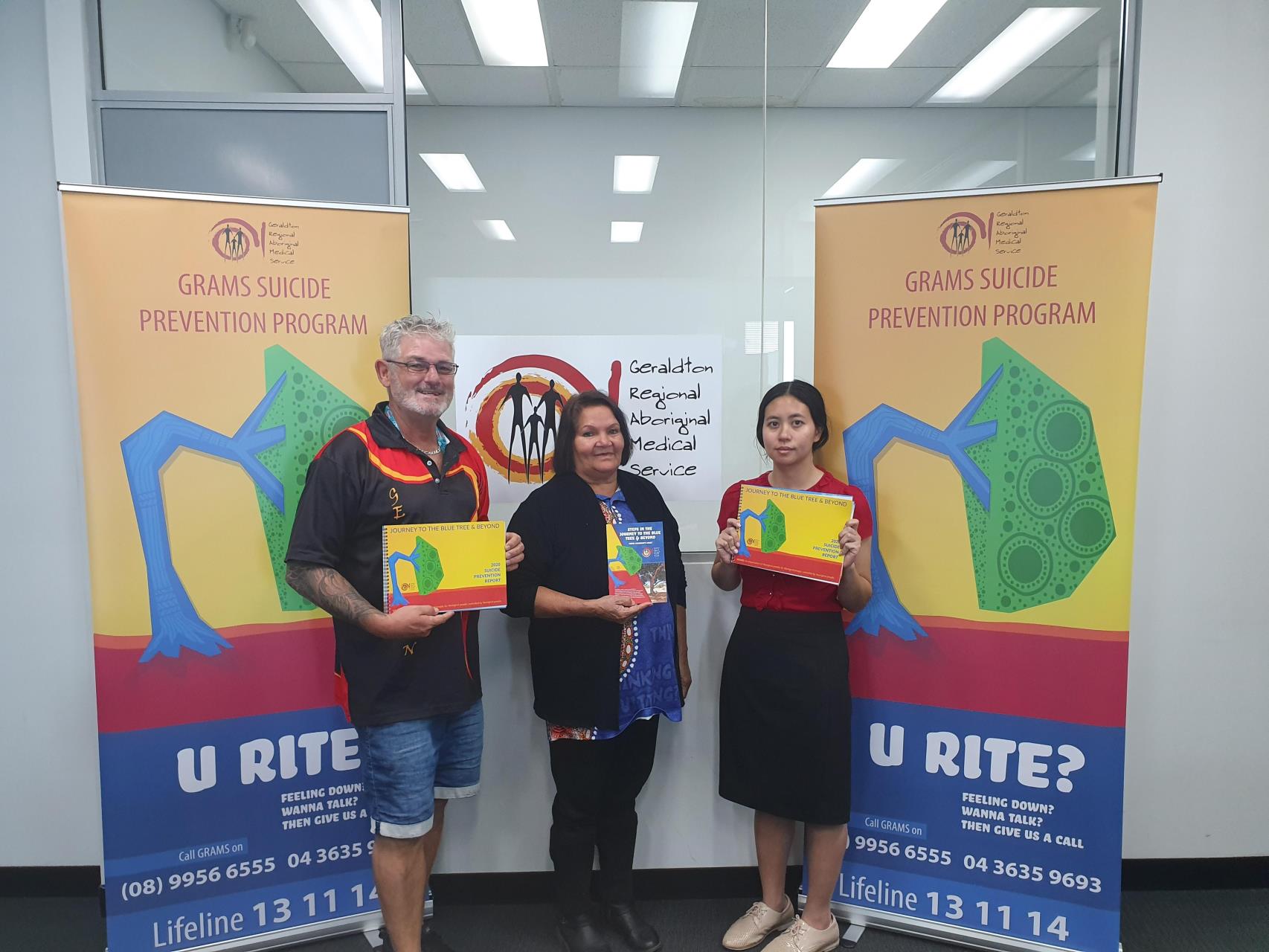Published on Wednesday, 21 April 2021 at 11:33:50 AM

GRAMS launches Suicide Prevention Report
Geraldton Regional Aboriginal Medical Service (GRAMS) is proud to formally launch the Suicide Prevention Report (2020) this week. It includes recommendations towards building community resilience and reducing the number of suicide-related deaths in Aboriginal communities.
In 2020, GRAMS engaged the community consultancy firm, Bank of I.D.E.A.S, to facilitate conversations with vulnerable communities in the Midwest and Gascoyne regions to help formulate the corresponding Community Safety and Wellbeing Action Plans unique to each locality.
These community consultations were made possible due to funding from the Western Australian Primary Health Alliance (WAPHA). Within several months, GRAMS covered the Greater Geraldton, the Midwest and Gascoyne regions, visiting multiple remote communities to conduct workshops on Suicide Prevention in 2020.
Elaine Laraia started at GRAMS in 2018 as a Suicide Prevention Coordinator and has experienced the challenges and hurdles of getting timely and appropriate help in the Aboriginal community.
“Over the years I’ve acknowledged that the healthcare system must be reviewed in terms of their treatment of First Nations peoples,” said Miss Laraia.
“The Community Safety and Wellbeing Action Plan is developed and led by Aboriginal people, ensuring a culturally appropriate response to Suicide prevention.”
“Through our community engagement workshops and extensive consultations, we were able to identify specific priorities in each community to tackle suicide prevention through local assets and support,” said Miss Laraia.
“We’ve received an overwhelming response from the community on their vision to create a nurturing environment where everyone can feel safe and supported.”

Suicide prevention workshop
According to the Australian Bureau of Statistics, Western Australia has the highest suicide rates amongst First Nations people over the last ten years, with the Midwest/Yamatji region being the highest in youth suicide rate in the world.
GRAMS Chief Executive Officer Deborah Woods said reducing the rate of Aboriginal suicides is a priority for GRAMS.
“Each year we are saddened by the passing of local people taking their lives, especially children and young people,” said Miss Woods.
“GRAMS acknowledges the pain and complexity of suicide so we endeavour to learn as much as we can about self-harm and suicide, with the intent of making a change somewhere, somehow.”
Miss Woods said the Community Safety and Wellbeing Actin Plan was co-designed with Aboriginal communities to help guide change and improvement in how we address mental health.
“With the launch of the Community Safety and Wellbeing Action Plan, we can take a step closer to providing improved care and support for those in crisis – ultimately saving lives,” said Miss Woods.
“The Action Plan provides a framework for a coordinated approach to address suicide prevention through localised and Aboriginal led solutions.”
GRAMS is hosting two events this month on Friday 23rd April to mark the launch of the Suicide Prevention Report 2020.
Key health organisations, Ministers and government officials are invited to the formal launch and presentation of the Community Safety and Wellbeing Action Plan, including Hon Stephen Dawson MLC Minister for Indigenous Affairs, Mental Health and Industrial Relations. This will be followed by an evening community event open to the public – for further details see below.
Event details
When: Friday 23 April 2021
Time: 6:00pm to 11:30pm
Where: Belmont Sports and Recreation Club
Cost: $30 Tickets can be purchased from 44/Unit 6 Belmont Ave, Belmont
Theme: Blue
If you or anyone you know is struggling with mental health, call the numbers below for help:
- Lifeline 13 11 14
- Kids Helpline 1800 551 800
- Suicide Call Back Service 1300 659 800
- Beyond Blue 1300 224 636
- Crisis Care 24/7 1800 199 008
- Midwest Ribbon for Life 0428 381 545
- In an emergency call 000
Back to All News